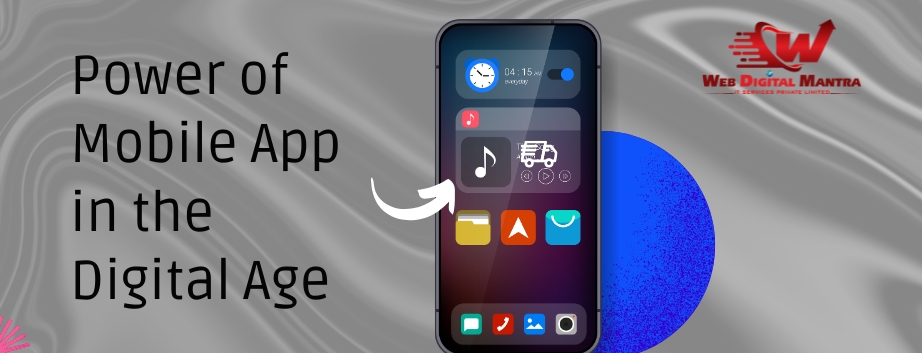
Mobile App has become more than just a buzzword it's a necessity for modern businesses and consumers alike. Whether you’re ordering food, booking a ride, managing finances, or staying fit, there’s a mobile app that simplifies your life. For businesses, it’s a direct way to reach, engage, and retain customers.
A mobile app is a software application designed specifically for use on smartphones and tablets. Unlike traditional desktop software, mobile apps are optimized for smaller screens and touch-based interfaces. They are available across various platforms such as iOS (Apple), Android (Google), and even cross-platform frameworks like Flutter or React Native.
Mobile apps can be categorized into:
Native Apps: Built for a specific platform (iOS or Android) using platform-specific languages.
Web Apps: Accessed through mobile browsers; responsive websites that mimic app-like functionality.
Hybrid Apps: A blend of native and web apps; developed using a single codebase and wrapped in a native container.
The digital consumer is always connected, and businesses must meet them where they are on their phones. Here's why mobile app development is a smart investment:
1. Direct Customer Engagement
Apps provide a direct channel to engage users with push notifications, updates, in-app promotions, and personalized offers.
2. Brand Visibility
Having an app on a user's home screen boosts brand visibility and reinforces customer loyalty.
3. Data-Driven Decisions
With integrated analytics, you can track user behavior, refine UX, and make smarter business decisions.
4. Improved Customer Experience
Mobile apps offer faster performance, offline access, and a more intuitive user interface compared to websites.
5. Revenue Generation
Apps can be monetized through ads, in-app purchases, subscriptions, or direct product sales.
Whether you’re building an app for your startup or modernizing your enterprise operations, understanding the app development life cycle is key.
1. Ideation & Research
Everything starts with an idea. Conduct market research, analyze competitors, and understand your target users’ pain points.
2. Wireframing & Prototyping
Designing the layout and user journey is critical. Tools like Figma, Sketch, and Adobe XD help visualize your app before development begins.
3. UI/UX Design
A visually appealing and user-friendly interface can make or break your app. Invest in intuitive and interactive design.
4. Development
This is where code brings your app to life. You’ll need to choose between:
Native Development (Swift for iOS, Kotlin/Java for Android)
Cross-platform Development (Flutter, React Native)
Progressive Web Apps (PWAs) for lightweight access
5. Testing & QA
Ensure your app is bug-free, secure, and compatible across devices through rigorous testing.
6. Launch & Deployment
Once tested, your app is deployed to the Apple App Store and Google Play Store.
7. Post-launch Support
Continual updates, feature additions, and performance optimization are crucial for long-term success.
Hiring the right team can dramatically affect the success of your app. Here’s what to look for in professional app developers:
✅ Technical Expertise
Ensure they are well-versed in relevant programming languages and frameworks for your desired platform.
✅ Proven Portfolio
Review past projects. Have they developed apps in your industry or similar functionality?
✅ Transparent Communication
Choose a team that communicates clearly and frequently. You need partners, not just coders.
✅ UI/UX Design Skills
A great app is functional and beautiful. Design-first developers create more user-centric apps.
✅ Agile Methodology
Agile teams can adapt quickly, allowing for iterative development and faster delivery.
1. Face-to-Face Meetings
Local teams allow for in-person brainstorming, faster feedback, and stronger collaboration.
2. Understanding Local Market
Developers in your region are more likely to understand your business climate, local customer behavior, and regional regulations.
3. Time Zone Compatibility
Working in the same time zone ensures real-time communication and quicker response rates.
4. Ongoing Support
Need urgent changes or updates? Local developers can be more readily available for quick support.
5. Boosting Local Economy
Working with local talent supports your regional tech ecosystem.
Modern mobile app development leverages a suite of advanced technologies:
Flutter: A Google-backed framework for building beautiful cross-platform apps.
React Native: Developed by Facebook; allows writing code once for iOS and Android.
Swift & Kotlin: Preferred languages for native app development.
Firebase: Backend-as-a-Service for real-time database, authentication, and analytics.
Node.js & Python: Backend technologies for scalable app servers
Nearly every industry is adopting mobile technology to transform experiences:
E-commerce: Shopping apps with features like AR try-ons and easy checkout.
Healthcare: Appointment scheduling, telehealth, and health tracking.
Education: Online learning apps, quizzes, and student-teacher interaction.
Fitness: Workout tracking, personalized coaching, and wearable integration.
Finance: Budgeting tools, banking apps, and secure mobile payments.
With emerging tech trends, the landscape of app development is rapidly evolving:
AI & Machine Learning: Personalized content, smarter chatbots, and predictive analytics.
AR/VR Integration: Enhancing experiences in retail, education, and gaming.
IoT-enabled Apps: Connecting apps to smart home devices, wearables, and vehicles.
5G Technology: Ultra-fast download speeds and seamless streaming.
Super Apps: Apps that offer multiple services under one roof (e.g., payments, chat, shopping).
1. How long does mobile app development take?
It depends on the app’s complexity. A basic app can take 2-3 months, while complex enterprise apps may take 6 months or more.
2. What’s the cost of developing a mobile app?
Costs vary by features, platforms, and region. A simple app may cost $5,000–$15,000, while complex apps range from $50,000–$200,000.
3. Can I update my app after it’s launched?
Absolutely. Regular updates are crucial for adding features, fixing bugs, and improving performance.
4. Should I build an iOS or Android app first?
It depends on your target audience. If budget allows, consider building for both platforms or go cross-platform with Flutter or React Native.
5. Where can I find reliable app developers near me?
Search online directories like Clutch, Upwork, or simply Google "app developers near me" and review portfolios and client testimonials.
A mobile app is no longer a luxury it’s a strategic asset that can revolutionize your business. With the right approach to mobile app development, backed by skilled app developers, you can create experiences that engage, convert, and delight your users. Whether you're searching for app developers near me or working with a global team, success lies in smart planning, intuitive design, and agile execution.
Start small, think big, and let your app be the bridge between your business and your digital audience.
 Ganesh B R
Ganesh B R
Copyright @2020. All Rights Reserved by WEB DIGITAL MANTRA IT SERVICES PVT LTD
Post Reviews